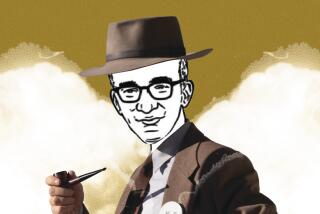MOVIE REVIEW : Thriller Ring to ‘Bellman’
- Share via
The pungent British heist thriller “Bellman and True” (selected theaters Friday) takes its title from a Scottish hunting song about John Peel and his faithful hounds. It’s a double pun, on the names of Peel’s dogs and on the temporary profession of the film’s protagonist, Hiller (Bernard Hill), who unwillingly becomes the bellman (alarms system eliminator) for a gang trying to crack Britain’s National General Bank.
Like a leitmotif, the Peel song runs through this film. Sometimes it’s a music-box nursery ballad, sometimes an orchestral theme, sometimes a rousing Lonnie Donnegan-sung tropical rocker. And this repetition accentuates the movie’s near-fairy-tale quality.
Much of “Bellman and True” is familiar: the car chase, the double-crosses, the baroque desolate hideaways in torn-up mansions or lonely beaches, the airport escapes, the explosions, the colorful, swaggering villains and the long, sweaty-fingered robbery itself. They’re so close to cliches--borrowed from Graham Greene, from “The Killing” and dozens of others--that it seems a miracle how often the film makers can juggle them flashily to life.
Sometimes they don’t. Richard Loncraine’s direction has such a tight, mechanical quality--with its harsh-edged angle shots full of shadowy depths and searing colors, its fixation on robots and gadgets, clocks and TV screens--that the movie threatens to become airless and doomed: a slicked-up “Rififi” or an “Asphalt Jungle” transplanted to the computer age.
What keeps it alive and throbbing are the conscious manipulations of those cliches. There’s a joyousness in the way they’re piled one on top of another, while a more vibrant, realistic drama--about the love between the desperate, failed Hiller and his kidnaped stepson--is jammed through the cracks.
Hiller is a computer systems engineer, a near-alcoholic whose wife leaves him with his stepson, the unnamed Boy (Kieran O’Brien). Hiller has sold himself to the devil: a dapper, silky smoothie named Salto (Richard Hope), who keeps calling him “dear heart” and who hired him to steal computer bank tapes. When, after being fired, Hiller tries to welsh and run, Salto imprisons him and the Boy--and demands that he crack the huge bank’s security code.
It’s then that the movie takes an eerie psychological turn. Salto is a stylish homosexual who nurses gentler feelings for Hiller and the Boy: He’s an apologetic tyrant. But the man he brings in to supervise the robbery, the Guv’nor, is a sadistic super-male butcher boy, a psychopathic papa. As the Guv’nor, Loncraine has cast Derek Newark, an actor who--with his Roman nose and mustache--looks enough like Bernard Hill’s Hiller to be his older brother.
There’s a bizarre linkage here. Hill is an actor who’s brilliant at expressing repressed or erupting violence, but he does the role here tightly wound; until the end, it’s Newark who does all the erupting. Newark’s Guv’nor is a great roaring rotten sadistic bully, and his constant bursts of cynical invective galvanize the movie--as in the savage sneer “What do you want? A happy bloody ending?” when Salto tries to plead for Hiller’s life. The doubling--the visual links between Hiller and the Guv’nor, and subtler ones between Salto and the Boy--suggest a macabre shadow parody of fatherhood in a near-femaleless outlaw world.
The actors have a high, lusty time with all this; not just Hill, Hope, O’Brien and Newark, but Ken Bones as Salto’s gargoyle of a sidekick, and Frances Tomelty as the terse prostitute-nursemaid, Anna.
“Bellman and True” is a juicy, very traditional heist thriller. The movie sweeps us into the exciting mechanics of the robbery: the thieves bypassing alarm systems and closed-circuit TV, the gadgetry, the entrapment by errant camera switch and rampaging elevator.
Loncraine’s style is more reminiscent of Carol Reed than Hitchcock or Huston. It’s jagged, constantly tilted, near-baroque. But he pitches everything around the comic intensity of the dialogue, and screenwriter Desmond Lowden, who adapted his own novel, writes conversation that’s almost reminiscent of Greene’s or Raymond Chandler’s: racy, salty lingo juxtaposed with more poetic heightened language.
The villains spout viciously cynical slang, while the beleaguered father and son--the bellman and his true boy--talk together with lyrical tenderness and despair. It’s in these scenes--and perhaps there should be even more of them--that the film finds its true emotional center, its pulse of love and truth in a deadly, violently askew world.
That sheer shot of passion is the jolt that sends “Bellman and True” (MPAA-rated R for sex, violence, language and nudity) roaring off--like two hounds steady on their scent, racing swiftly, coolly and relentlessly toward their hot, elusive prey.
More to Read
Only good movies
Get the Indie Focus newsletter, Mark Olsen's weekly guide to the world of cinema.
You may occasionally receive promotional content from the Los Angeles Times.










